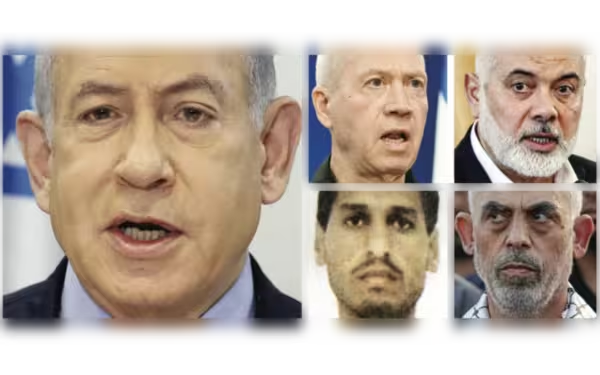Saturday, November 16, 2024 07:43 PM
ICC Seeks Arrest Warrants for Hamas and Israeli Leaders
- ICC targets key figures in Israel-Hamas conflict.
- Karim Khan cites reasonable grounds for war crimes.
- International community shows support for ICC's actions.
 Image Credits: arabnewspk
Image Credits: arabnewspkICC pursues arrest warrants for key figures in Israel-Hamas conflict, citing war crimes and humanitarian law violations.
In a significant development in international law, the International Criminal Court (ICC) has sought arrest warrants for several prominent figures involved in the ongoing conflict between Israel and Hamas. This move, which took place in May, highlights the ICC's commitment to addressing alleged war crimes and crimes against humanity committed during the recent hostilities.
The individuals named in the warrants include key leaders from both sides of the conflict. On the Palestinian side, Hamas leader Yehya Sinwar, who is considered the mastermind behind the October 7 attacks on Israel, is among those targeted. Other Hamas figures include Mohammed Diab Ibrahim Al-Masri, known as Deif, who leads the military wing of Hamas, and Ismail Haniyeh, the former head of the Hamas Political Bureau, who was assassinated by Israel in July. On the Israeli side, Prime Minister Benjamin Netanyahu and Defense Minister Yoav Gallant are also facing accusations.
Karim Khan, the chief prosecutor of the ICC, has stated that there are reasonable grounds to believe these leaders are criminally responsible for the deaths of hundreds of Israeli civilians during the October 7 attacks, as well as for the abduction of at least 245 hostages. Khan emphasized, "We submit that these crimes could not have been committed without their actions." He further accused Netanyahu and Gallant of committing war crimes, including the starvation of civilians and intentionally directing attacks against civilian populations.
In response to the ICC's actions, Israel's foreign ministry filed a petition to appeal against the warrants, arguing that the ICC did not allow Israel the opportunity to investigate the claims raised by the prosecutor. When asked about this assertion, Khan firmly stated, "No is the short answer," reiterating that his office is investigating crimes alleged against both Hamas and Israeli leaders.
The situation has drawn criticism from various quarters, including U.S. President Joe Biden, who labeled Khan's move as "outrageous," suggesting that it implies an equivalence between Hamas and Israel. Some U.S. legislators have also condemned the ICC, with certain Republican lawmakers threatening to impose consequences against the tribunal. Senator Tom Cotton described Khan's actions as "a farce." In response, Khan expressed his commitment to the law, stating, "As an officer of the court, the umbrella of the law should apply equally."
Support for the ICC has also emerged from the international community. UN Secretary-General Antonio Guterres expressed his backing for the ICC's decisions, while Pascale Baeriswyl, the Swiss UN ambassador, reaffirmed her country's long-standing support for the court. She emphasized the importance of allowing the ICC to fulfill its mandate without intimidation.
Khan has made it clear that the application of international humanitarian law must be equal for all individuals involved in conflicts. He warned that failing to apply the law uniformly could lead to its collapse, which would undermine the safety net that victims rely on during times of suffering. He stated, "Now, more than ever, we must collectively demonstrate that international humanitarian law...applies to all individuals and applies equally across the situations addressed by my office and the court."
This situation serves as a reminder of the complexities of international law and the challenges faced in holding leaders accountable for their actions during conflicts. As the ICC continues its investigations, the world watches closely, hoping for a resolution that upholds justice and human rights for all parties involved.













